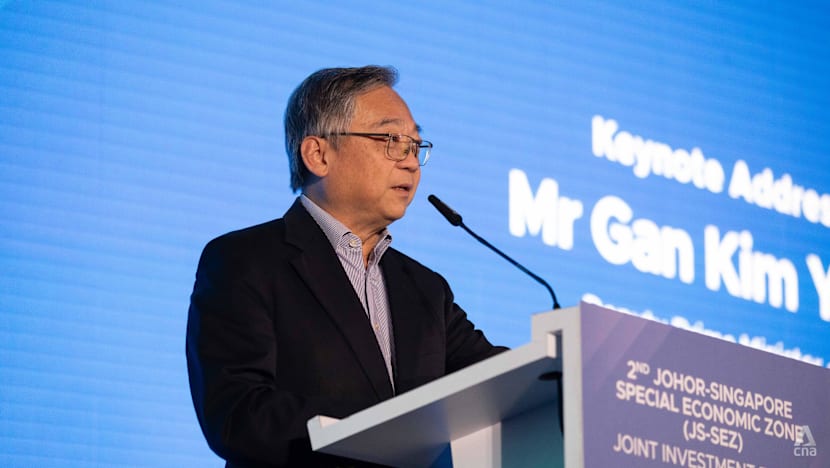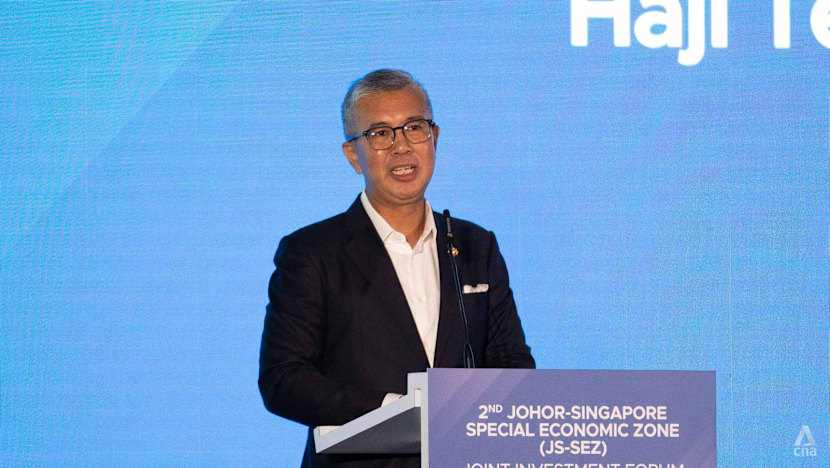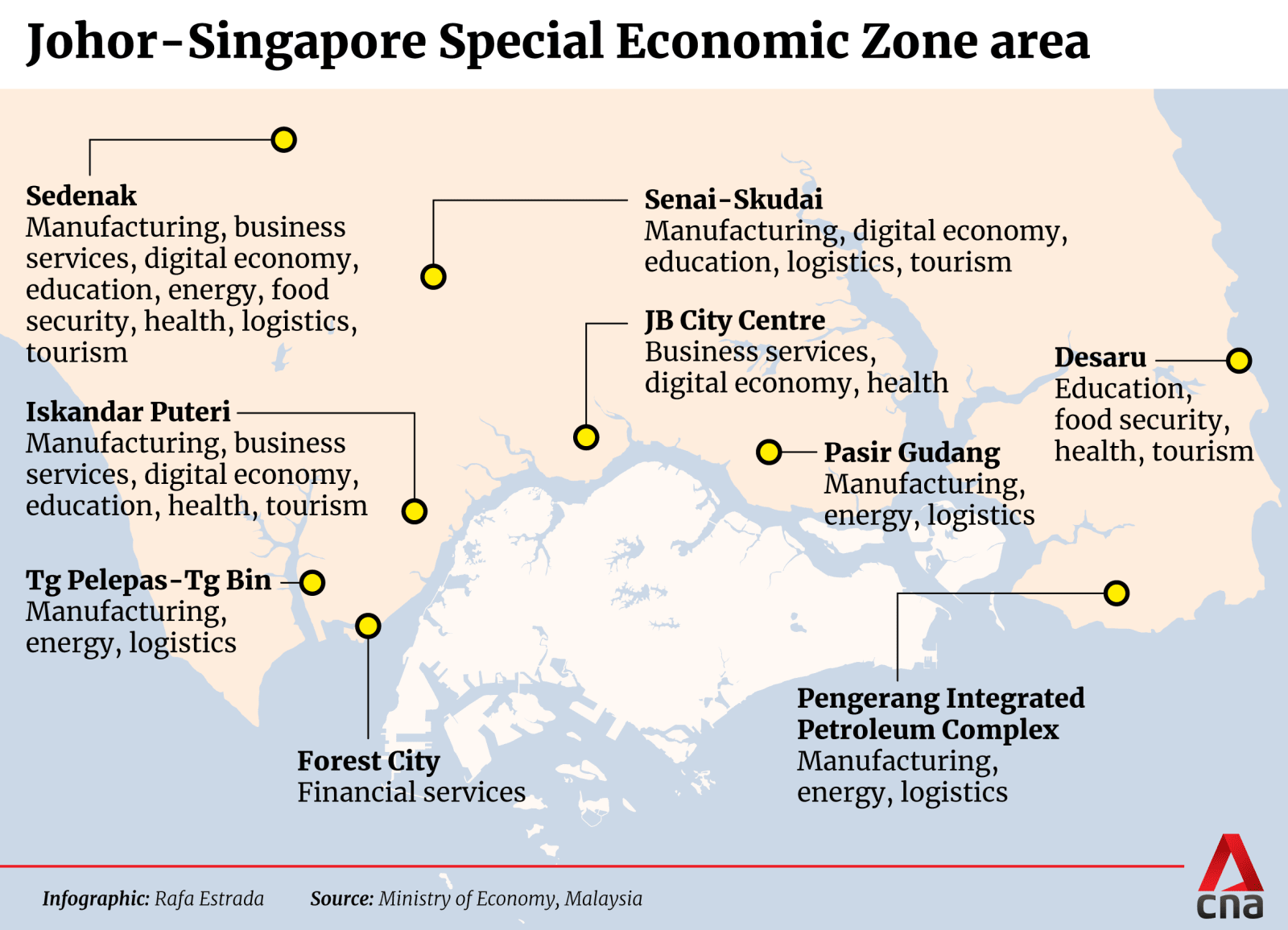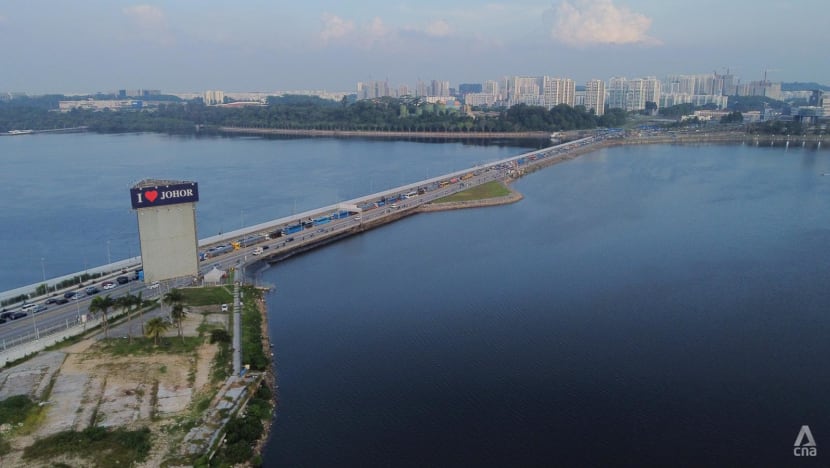Singapore firms commit S$5.5 billion of investments to SEZ in Johor; Malaysia unveils new steps to woo investors
Malaysia Investment, Trade and Industry Minister Tengku Zafrul Abdul Aziz announces fast-track licences for manufacturing projects and a bigger kitty for government co-investment that can be tapped by Malaysian SMEs.

Deputy Prime Minister Gan Kim Yong speaking at the Johor-Singapore Special Economic Zone (JS-SEZ) joint investment forum at Marina Bay Sands Expo and Convention Centre on Oct 14, 2025. (Photo: CNA/Lim Li Ting)

This audio is generated by an AI tool.
SINGAPORE: New measures are being rolled out in the Johor-Singapore Special Economic Zone (JS-SEZ) to bolster investor momentum, even as companies based in Singapore have committed over S$5.5 billion (US$4.23 billion) in investments into the project since last January.
These were revealed by Malaysia and Singapore at the 2nd Johor-Singapore SEZ Joint Investment Forum held on Tuesday (Oct 14) in Singapore.
Malaysia’s Investment, Trade and Industry Minister Tengku Zafrul Abdul Aziz said it will fast-track licences for manufacturing projects within the SEZ’s identified economic sectors, which are manufacturing, logistics, food security, tourism, energy, digital economy, green economy, financial services, business services, education and health.
Approval of manufacturing licences for non-sensitive industries will be granted within seven working days, with a required “no objection letter” from the Johor state government also to be issued in seven working days, he told 900 business leaders, investors, policymakers, and academia from both countries at the forum.
MALAYSIA’S BUDGET 2026 ALLOCATIONS
As for financing, an additional RM200 million (US$47.3 million) has been allocated under the Strategic Co-Investment Fund, where the government co-invests alongside private investors.
The extra funding, which is part of Malaysia’s Budget 2026 unveiled last week, can be tapped by Malaysian small and medium enterprises (SMEs) in the JS-SEZ.
The funding enables co-investments in high-impact projects by Malaysian SMEs in the zone, particularly those that contribute to strengthening the cross-border industrial ecosystem between Johor and Singapore, Mr Zafrul said.

He added that the co-investment fund also aims to enable these SMEs to scale up and go global, especially in areas such as capacity expansion, tech adoption and sustainability.
“This financing effort will complement the policy and infrastructure incentives being introduced under the Johor-Singapore SEZ, ensuring a more holistic enabling framework,” he said.
Under Malaysia’s New Industrial Master Plan (NIMP) 2020, the co-investment fund will become a “key financing instrument” for industrial growth in the zone, Mr Zafrul said.
Malaysia’s Budget 2026 has also allocated RM650 million through the Skills Development Fund Corporation to support talent development for sectors targeted under the NIMP 2020, he said.
It is expected to benefit roughly 25,000 trainees in sectors such as artificial intelligence (AI), electric vehicles and semiconductors, which support the JS-SEZ’s ambitions, he said.
The initiatives add to existing schemes.
Johor introduced an attractive tax incentive package and set up the Invest Malaysia Facilitation Centre in Johor in February this year to support investors through a streamlined, one-stop platform. This reduces bureaucracy by not having to engage with multiple agencies across different locations.
Since April, eligible foreign investors – new, existing and potential – have been able to get a multiple entry visa valid for up to 12 months, under the Investor Pass initiative led by the Malaysia Investment Development Authority.
The authority can “proactively offer the Investor Pass directly to multinational companies and prospective investors in high-value sectors”, added Mr Zafrul.
This, he said, reflects Malaysia’s commitment to “reducing friction for high-impact investors”, including those in the JS-SEZ.
COOPERATION OVER CONTESTATION
In his speech, Singapore’s Deputy Prime Minister Gan Kim Yong said that since the JS-SEZ memorandum of understanding signing in January 2024, Singapore-based companies have committed more than S$5.5 billion in investments into Johor.
“We look forward to more investments in the months ahead,” he added.
Mr Gan, who is also the trade and industry minister, said the three key priorities to realise the economic zone’s “full potential” are to anchor flagship projects, make it easier to do business and ensure inclusive growth for SMEs.
“At a time when global trade is slowing and protectionist pressures are rising, the Johor-Singapore SEZ stands as a strong illustration of what countries can achieve when they choose cooperation over contestation, and partnership over protectionism,” he said.
Mr Gan said the project has made “good headway”.
Spanning 3,571 sq km in southern Johor, the zone will consist of nine “flagship areas” catering to the economic sectors identified.

Both countries must also continue to make the economic zone more “business-friendly” and “future-ready”, Mr Gan said.
This includes streamlining regulatory processes, improving the ease of cross-border flow of goods and professionals, and strengthening skills and talent development to raise the quality of human capital in the zone.
Singapore has established a Joint Johor-Singapore SEZ Project Office, which comprises its Ministry of Trade and Industry, the Economic Development Board and Enterprise Singapore, to work directly with Malaysian counterparts to smoothen regulatory processes and help companies establish themselves on both sides, said Mr Gan.

SERVING THE COST-SENSITIVE AND TIME-CRITICAL
He cited several firms that have benefitted from the partnership, including global logistics firm Kuehne+Nagel (KN).
The firm has developed an integrated transport and logistics network across Singapore and Johor.
In Singapore, it operates from six sites, including a 48,000 sqm logistics hub at Pioneer Crescent.
A total of 75,000 sqm of fulfilment centre space is supported by 500 employees. The facilities serve high-value industries such as pharmaceuticals and semiconductors.
In Johor, KN operates from the Port of Tanjung Pelepas and a central office, offering nearly 50,000 sqm of fulfilment capacity. Its facilities are supported by 85 employees.

“Johor offers cost-effective fulfilment capacity and space advantages, complemented by our facility at the Port of Tanjung Pelepas,” the company’s managing director Peer Rasmussen told CNA.
“With seamless road freight connectivity, businesses can tap Malaysia’s cost-efficiency alongside Singapore’s global connectivity through PSA and Changi Airport, benefiting from the combined strengths of both markets as part of a broader regional strategy.”
Such a dual-location model gives customers flexibility – time-critical cargo can move through Singapore while cost-sensitive or scalable activities are managed in Johor.
Describing KN’s experience operating within the JS-SEZ as “encouraging”, Mr Rasmussen said there is still room for progress, such as the wider adoption of digital customs processes and paperless trade.
“This would not only accelerate clearance times but also contribute to more sustainable cross-border operations,” he said.


















